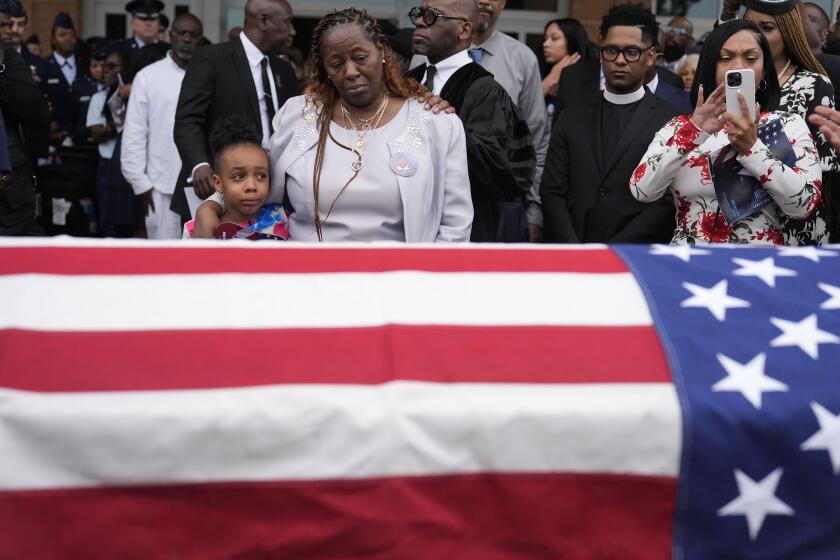U.S. Is Faulted for Using Private Military Workers
The U.S. government’s use of private military contractors to conduct interrogations in Iraq and to transport suspected terrorists creates “rule-free zones” and allows abuses to go unpunished, Amnesty International charged Tuesday.
There are 20 known cases of civilian contractors suspected of committing criminal acts while handling detainees in Iraq and Afghanistan, but only one has been prosecuted thus far, said Larry Cox, Amnesty’s U.S. executive director.
“Amnesty International is not opposed to the use of private contractors,” Cox said at a news conference to release the group’s annual report on human rights. “But the reliance of the United States government on private military contractors has helped create virtually rule-free zones sanctioned with the American flag and firepower.”
The human rights organization said its research also showed that at least 25 American companies appeared to have been hired by the U.S. government to transport suspected terrorists to countries known for human rights violations, a practice that might make them “complicit in the U.S. government’s practice of outsourcing torture.”
The CIA has come under intense international criticism for the practice of “extraordinary rendition,” in which it captures terrorism suspects in one country and moves them to another for interrogation and detention. Less attention has been paid, however, to private companies whose airplanes and other transportation services have been used in the CIA’s program.
Private military contractors based in the United States and other countries have been a controversial presence in Iraq. Their role has come under greater scrutiny after four employees of Blackwater USA, a North Carolina-based security firm, were killed and two of their corpses hung from a bridge in Fallouja in March 2004.
An estimated 25,000 private security workers are employed in Iraq, costing nearly $50 billion since the start of the war. Estimates based on government reports indicate that more than 200 have been killed.
Defense Secretary Donald H. Rumsfeld has repeatedly defended the Pentagon’s use of private contractors, saying it is an effective way to free up military personnel and other government employees working in combat zones.
In December, Rumsfeld acknowledged that such contractors were not covered by military law, but he argued that Iraqi laws as well as U.S. civilian laws govern the behavior of Americans working in Iraq.
President Bush, who was asked about the legal status of contractors in Iraq at a town hall session last month, said he delegated such policy decisions to the Pentagon.
“I don’t mean to be dodging the question, although it’s kind of convenient in this case,” Bush joked after a talk to graduate students in Washington. “I’m going to call the secretary [Rumsfeld] and say you brought up a very valid question, and what are we doing about it?”
In January, the Justice Department acknowledged that it was looking into 11 allegations of detainee abuse by civilians from the Pentagon, as well as those involving nine civilians from “another agency,” believed to be the CIA.
Other than the case against former CIA contractor David Passaro, in which assault charges were filed two years ago in connection with the June 2003 beating death of a detainee in Afghanistan, all of the others have been referred to a task force set up in the U.S. attorney’s office in the Eastern District of Virginia, the Justice Department said. No other charges have been filed in any of the cases. Passaro is awaiting trial.
Amnesty officials said despite allegations of abuses, there were signs that the industry was beginning to establish self-regulating guidelines that could help prevent such problems in the future.
Laura Dickinson, a University of Connecticut law school expert on military contractors who has worked with Amnesty International on the issue, said she had been in contact with the International Peace Operations Assn., a newly formed trade group for private military groups, about ways to change contracts and regulations governing the companies.
Dickinson said she had studied 60 publicly available contracts of private companies working for the U.S. government in Iraq and found that none of them required employees to obey international human rights and humanitarian laws, provisions that could easily be added to government contracts.
She said many domestic government contracts, such as those for companies running state prisons, routinely included provisions for such laws, as well as an accreditation process that prevented companies from winning such deals without the approval of national trade associations.
More to Read
Start your day right
Sign up for Essential California for news, features and recommendations from the L.A. Times and beyond in your inbox six days a week.
You may occasionally receive promotional content from the Los Angeles Times.






